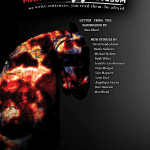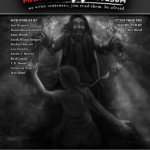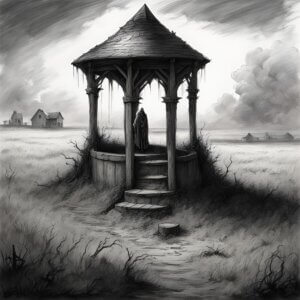Erwin Baldridge lived in a run-down house on Caney Creek. Each week he went to Mt. Sterling to buy more beer. He put it in burlap sacks in his truck bed and drove back as casually as if he were taking his wife out for a Sunday drive (back when his wife was around for him to do such things).
He never got pulled over.
His second cousin, Joe Hamm, was county sheriff. Not to mention Erwin had earned himself a medal over in France. There were always gonna be bootleggers, the general feeling was, better a war hero than some bum.
As a rule, nobody caused Erwin Balridge any trouble.
For one thing, he packed a pistol on his hip everywhere he went. For another, he had a big dog named Jack who would turn from the laziest mutt to a frothing tank of fur and teeth with a single “Chere!”
Moreover, most people just liked him. He didn’t talk much but he smiled often and he would give you the shirt off his back if you asked him. The only thing anyone could say against Erwin Balridge was that his breath stank.
Course, no one said that to his face.
Erwin let whole rooms of his house go after his wife left him. The place, originally his daddy’s, slumped on a knoll that overlooked the dirt road that ran beside the creek.
There were two windows on the porch.
The one on the right looked into the kitchen, which was the only room that Erwin really used anymore. He slept on a cot in the rear of the room and washed in a tub behind the house and kept his clothes and personal items in the cellar with the canned goods and extra beer.
The window on the left looked into the old bedroom. The bed and dresser in it were covered in a thick layer of dust. The floor was a maze of empty cans and rusty tools, broken plows and filthy quilts, silverfish-eaten books and empty cartridge boxes.
Erwin didn’t go in there anymore. No one did. He had blocked it off with the icebox that he kept his beer cool in.
A vine had worked its way into the old bedroom. It climbed along the walls and window like a creek through the hills, splitting off into smaller tributaries that wormed their way around ancient picture frames and rusted nails.
In the fall, his customers knew that if they couldn’t find Erwin at his house that he’d be out in some neighbor’s field helping bring in the harvest. You just had to ask around to find out whose.
No one had ever dared let themselves into his icebox when he was gone. And no one would have bragged about it if they had.
All told, Erwin Balridge hadn’t had any trouble at all, not in years, not since his wife left him, until the day the grapevine man came.
#
Maud Wallace borrowed her daddy’s Model B Ford. He let her take it because he thought she was too fat and ugly to get pestered by any boys. He never considered the possibility that she might be the one doing the pestering.
Her father couldn’t see it but there was a certain handsome charm to Maud. Her hair was dark and fine with light curls in it and her eyes were brown and warm with little shards in them and her lips were full when not hurling a half-smiling insult.
Of course, Maud knew well she wasn’t the reason Harold Branham and Ike Middleton were riding around with her. That was Kathy Maggard’s draw. She was the pretty one.
The nicer one, too.
But Maud had the car and the wherewithal plus she was the one who actually wouldn’t have minded to screw.
Maud picked up the boys before she picked up Kathy because Kathy lived on the far side of the county. If Harold and Ike had tossed a coin to decide which one of them would have to sit up front with Maud, she wouldn’t have been offended.
Both of them were pretty ugly themselves.
They had one quick stop to make before they went to pick up Kathy. Erwin Baldridge’s place wasn’t exactly on the way but it was the sort of place and had the sort of things in it that was worth making a detour for.
Maud flew down Caney Creek so fast that the wind almost yanked the cigarette out of her mouth. Beside her, Ike Middleton was rolling his own. In the backseat, Harold Branham sat with his hand laid flat on the right cushion.
It was almost like he was already grabbing Kathy Maggard’s ass. Not that he’d likely dare.
“Harold Branham,” Maud called back to him. “You get your hands off that invisible girl and get your wallet out. We’re coming up on Erwin’s place.”
Harold blushed, laughed, and shook his head. “We’re still gonna go half and half, right, Ike?”
Ike raised up his hat and scratched underneath it. His hair was fading into a widow’s peak. He still had a smudge on his right forehead that probably was coal but just as likely could have been smeared manure.
“I reckon that’s only fair,” he said. “Since Maud provided the automobile and all. Or her daddy did.”
“Not to mention the gas,” she said. “And I didn’t get that from my daddy, I got that from working at Ned Kegley’s place.”
Maud took a wide turn in the road. The Ford dipped into a shallow spot, popped up over a rut, and then got scratched by the stretched branches of scrubby trees hanging sideways off a rock cliff.
On the far side of the road was a bank that climbed to a field. Atop that bank stepped a man.
He flung his arms wide as Maud passed him. She looked over to him and in that brief look she figured him for a hobo. He wore dusty boots and tattered pants and an old gray shirt with one missing breast pocket.
He had something around his neck.
Then he was gone, passed up, obscured by a grove of pine, before Maud Wallace could get a better look at him. “Was that a rope around his neck?” asked Maud.
“What?” asked Ike. He had had his head turned back, too, but he had been too busy yapping at Harold (George Ball nearly talked himself into a fistfight at work today) to notice the man on the bank.
“There’s no use explaining,” Maud replied, after considering explaining for a second. “You just missed it, is all.”
She tossed her cigarette butt out the window and let off the gas as her daddy’s car turned another bend. Straightening out again, she spotted Erwin Balridge’s farmhouse atop a small hill to the left of the road.
Maud glanced back at Harold. “You been here before, ain’t you, Branham?”
“Sure, I been here.” He shrugged. “My brother Jimmy took me here when I was ten years old.”
“Good,” said Maud. She turned into Erwin Baldridge’s yard. She parked in a dirt patch next to his old truck. “Because I am grown thirsty.”
She turned off the engine, ran her hands down her green dress to pull the hem further down her rather prodigious thighs, and looked over at Ike Middleton.
“Well,” she said, “Erwin won’t sell beer to no woman my age, so why don’t you two go on and run the hell inside.”
Ike looked from Maud to Harold in the backseat.
“I reckon I might just stay here with you,” he said. She knew he wasn’t about to make a pass by the way he cleared his throat after. She smiled. Sometimes when she smiled she felt like a tough ol’ catfish.
“You don’t have to be scared of Erwin Baldridge,” she told him. “I’d go up, shake his hand, and not think twice about it except he wouldn’t let me take any beer with me when I left. Sorta old fashioned that-a-way.”
“I ain’t scared of no bootlegger,” said Ike Middleton. “I just busted my hind end at work today and am feeling pretty comfortable here and don’t see the need for both of us to go in when one can do.”
“Yeah, I bet you put in a good day’s work for once in your life,” Harold said. “I know you’re plum exhausted and all but do you think you can manage to raise up off your poor sore ass long enough to let me out of this jalopy?”
He punctuated his remark by pushing the back of Ike’s hat up so that the front tipped down over his eyes.
“This ain’t no jalopy, you hear,” Maud said. Ike adjusted his hat, grumbled, and got out of the car. “It ain’t no rich man’s limousine but my daddy worked hard for this ride.”
Harold slid out onto the dirt patch. “No disrespect intended,” he said.
Then he looked up at the farmhouse. Jack was panting on the porch beneath the window into the long unused bedroom. The mutt was getting rounder and grayer by the day.
Ike sat back down beside Maud as Harold started towards the house. He eased the car door shut, looked over at Maud, saw her left elbow hanging out her open window in a casual manner, and stuck his right elbow out his.
“Baldridge and my daddy have had their problems,” Ike said, by way of explanation.
#
Harold Branham sure didn’t rush into Erwin Baldridge’s place. He took his sweet time.
In his own way, he was as scared of the man as Ike Middleton was. Unlike Ike, though, Harold knew that his fears were unfounded. They were just so long-held that they were hard to shake off.
When Harold was in fifth grade, his brother Jimmy, then seventeen, having at that time left school and gotten a job at Roy DeHart’s garage, managed to buy himself a used 1923 Chevrolet Coupe.
It was black and almost fancy. Jimmy even waved from it like a politician.
One day that summer Jimmy reluctantly agreed to drive his kid brother over to their grandparents farm on Elk Fork, where Harold was going to stay for most of the month.
Harold expected to have to work some but he knew he’d get to fish more and he pretty much only took his fishing pole and a change of clothes with him.
But Jimmy didn’t turn up Nickell Hill like Harold expected him to. He went on down to Caney Creek.
Harold didn’t ask him why because Jimmy had gotten so that he turned from pleasant to mean based on every little provocation. It was pleasant enough to ride with the windows down in the soft summer heat, anyway.
As the Coupe came around the bend in the road towards Erwin Balridge’s place Harold figured out their destination on his own. His father, an elder in the Primitive Baptist church, had pointed it out to him before.
“You’re not to say nothing,” said Jimmy, picking up on his little brother’s recognition. “I’m a grown man now, I work for my pay, and you don’t know it yet, but whiskey is good and so are loose women.”
Jimmy pulled into the dirt patch in front of the farmhouse.
“Erwin Baldridge don’t like nosy kids,” he continued. “They say in the war he dashed a couple French babies brains in. He was hiding from the Huns and they were making too much noise. It was them or him. That’s the sort of man we’re dealing with here.”
He put his hand on his little brother’s shoulder. “If you tell our folks and Erwin hears about it, he’s liable to beat both me and you to death. You ain’t gonna get me killed over a bit of corn whiskey, are you?”
“No,” said Harold. He interlocked his fingers in his lap. May have shivered. “I’ll keep my word, I swear. I ain’t no revenue man.”
Jimmy smiled, patted his head, and went in. Harold remembered thinking he walked pretty casually into the house of a man who may have murdered some French babies.
Later, of course, and that was a few years, he realized the whole thing had been made up.
But no one had made up the gun on Erwin Baldridge’s hip and even if Prohibition was over and Erwin Baldridge had moved from bootleg whiskey to bootleg beer, the few times Harold Branham had come around before, he had still half expected to get his head slammed against the floorboards.
The bottom step of the porch creaked as he stepped up. The kitchen door was open, as it most often was. Harold glanced over at the dog, who seemed to be asleep now, and went inside.
Erwin sat in the back in a stained white undershirt with a bushel of beans on the table and a couple mason jars near at hand. He looked like he had been out in the field all morning for someone. He was stringing them.
“Who are you supposed to be?” asked Erwin, as he snapped a bean’s back and then peeled off its hinge.
“Delaney Branham’s son,” said Harold. He had barely stepped into the place. He stuffed his hands in his pockets next to his chaw and his pocket knife.
Erwin wiped his forehead. It was creased and the hair above it was balding. Both his forehead and his roman nose were red with sunburn. The pores on his nose were like blackberry seeds. “Which one are you?”
“I’m Harold. Came up here about two months ago with Willie Oney.” He shrugged. “I guess a lot of people come up here.”
“Sure do,” said Erwin. “But not the sheriff and do you know why that is?” He dropped a bean into a half-filled jar. “Because everybody who comes up here knows I’ll treat them fair if’n they treat me fair. You look like a reasonable fellow yourself.”
“I like to think I am.”
“Then we can do business,” said Erwin.
#
Maud Wallace and Ike Middleton sat in the car for a couple of seconds before Maud placed her hand on his crotch. Ike almost jumped out of his seat but he didn’t move her hand and soon enough she felt him harden.
“What the hell are you doing, woman?” he asked her.
“Take it out,” she told him. “You ain’t going to get with Kathy, anyway. Harold’s got a better in there. And it’ll get awful boring sitting here waiting. Let me make you spill yourself. I can do it.”
“Out here?” asked Ike. “In the open? You — you’re pretty goddamned crazy, aren’t you, Maud?”
She sighed. “Put your hat on it if you like. And you can slip it away before Harold gets back.”
Ike licked his lips, shook his head, and undid his pants. He unbuttoned them so fast he nearly tore off the middle button. Maud dove her hand into the part in his long johns and grabbed at his warmness.
She tugged its head out into the air.
Ike slammed his hat over her hand.
“I’m going to hell, alright,” he said but he still let her pull him.
Since there was nothing to see inside but his pockmarked face, Maud stared out the windshield at the porch and wound up focusing on the window into the old room that Baldridge had blocked off.
She could just make out the mesh of a vine spread out across its broken glass.
Ike preferred to watch the hat move on his lap.
Neither of them heard the man coming. The first Maud knew of his presence was when he stepped into the edges of her peripheral vision. Her hand froze beneath Ike’s hat. She turned her head left.
The hobo she had seen earlier was maybe six feet away. He had stopped in the dirt patch, shoulders stooped, unshaven face down and neck turned taut, looking into the Model B.
The sun shone bright into his face from that angle yet he did not squint.
Now Maud could tell that the thing around his neck was not a rope. It was too stiff for rope, and darker brown. No, it was knotted grapevine, like what her uncle Ezra used to make into wreaths at Christmas.
Ike shifted uncomfortably beside her but Maud didn’t remove her hand. She didn’t think the man could see where it was, anyway, from his distance and past her shoulders.
“Can I help you, mister?” she asked.
The grapevine man grinned. His eyes were like rotting blackberries. A gnat darted from his ear.
Ike wilted in her hand.
Then the man looked down at the ground and made a halting series of movements past the car and towards the farmhouse.
The grass in the yard was ankle-high. Jumping bugs fled, disrupted by the impact of the man’s footfalls. Every step he took was nearly a stumble.
“That damned feller is wasted,” said Ike.
Maud still hadn’t moved her hand. The man almost made it to the porch steps before Erwin’s dog woke. It clambered onto its feet, reared its ears back, and showed its teeth.
The man with the grapevine necklace raised a finger to his lips.
And the dog never snarled. It just laid down and curled up on itself and went back to sleep.
Then the hobo was up the steps and under the doorway and talking to the men inside.
“I reckon you better let go,” said Ike.
Her hand moved, slowly at first and then, as he thickened, faster. “There’s no need for that,” she replied. “I’m already bored again.”
#
“I got about five brands of beer, some whiskey, and a couple jugs of homemade wine,” said Erwin Balridge. “But I don’t expect you came for that. That takes a more nostalgic drunk.”
There was a creak behind them as someone stepped onto the porch. Erwin tilted his head to the side to look past the Branham boy and then he frowned. “Can I help you?”
The man was dressed like a boy playing hillbilly and he wore a circle of grapevine twined around his neck. He smiled. His teeth were all rotted out of his head.
The Branham boy turned and stepped back. He backed up to the stove. The grapevine man stepped into the house.
“I know what I want to drink,” he croaked.
The man looked damned crazy. He had pinpoint pupils and an awful smile and he reminded Erwin of how Ves Cantrill had looked the last time he had ever seen him.
Ves was still up at Eastern State Hospital, the last Erwin had heard.
“You must have me mistaken, mister,” said Baldridge. “I don’t got nothing to drink except well water.”
The man swayed. He looked over at Harold and curled his top lip to the bottom of his nostrils.
“Er-win,” he said. “Er-win. That’s the name that I’ve been hearing for nearly miles. Everywhere I goes, everybody knows Er-win Bal-dridge.”
“Maybe they do,” said Erwin. “But I sure don’t know you.”
The grapevine man steadied himself against the icebox. “What’s on the other side of here?” he asked.
“Never you mind,” said Erwin. He kicked his chair so hard it slammed into his table and sent a small avalanche of green beans spilling. “You don’t have no goddamn right to be in here and I already told you to leave.”
The filthy stranger looked over at the Branham boy. “He never did that to those babies,” he said. “I’ll grant him that much.”
The kid’s eyes went wide. He looked over at Erwin. “I don’t need no beer, after all. I think I’d better get going.” But he didn’t move, the grapevine man was still blocking the door.
Erwin pulled his pistol and pointed it at the stranger. His hand didn’t shake, not even a little. “I already told you I don’t want you here.”
The grapevine man just wrapped his fingers around the rim of the icebox. “You keep your cold ones in here, don’t ya?”
He raised the lid.
Even Erwin looked. But it wasn’t the beer he put in there the day before that he saw. It was Lydie. She had always been a small woman, a pretty small woman. She lay in her ruffled sleeping gown with her face turned blue.
There was a big cut in her forehead where he had hit her with that ax.
The kid screamed.
The grapevine man laughed.
Erwin shot him.
#
In the backyard, an old sycamore tree along the woodline fell over and crashed into the woods, pulling up a tangle of roots and dirt behind it.
#
In the front yard, Maud Wallace’s hand clenched around Ike Middleton’s erection, half-crushing it.
#
On the front porch, Jack whimpered. And died.
#
The bullet slammed into the grapevine man’s face.
It chipped off his nose like a piece of clay and then he tipped over backwards, straight and almost dignified, to come down hard in the doorway.
#
A man named Boon Gatlin was riding in his brother-in-law Claude Haskell’s truck when they happened to hear the gunshot and see the grapevine man fall and the sycamore falling with him in the back.
“Hellfire,” said Boon.
Claude slammed the gas.
They rushed off to report the trouble so fast that neither of them saw the vicious beating that was taking place inside the Model B Ford parked outside.
#
Erwin looked back at the icebox. There was only beer in it. Of course, there was only beer in it. He had buried Lydie in the yard as soon as the ground had thawed. He looked at the Branham boy.
“I didn’t see nothing,” the kid said. “It’s just beer, ain’t it?”
“Yeah,” said Erwin. “Get you some. On the house.”
“Thanks,” said the kid. “But I ain’t so thirsty now.”
Then he ran across the room and leaped over the dead man and fled from the house.
#
Running across the yard, Harold saw Ike bent over in his seat and Maud leaning against the driver’s side door. He grabbed Ike by the shoulder through the open window.
“Let me in,” he said.
“She hurt me,” said Ike. “So I hit her.”
Harold looked over his shoulder at Maud. She was breathing, slowly, with a dazed expression on her face and a dozen bad bruises on her face. Her nose and lips had drying blood around them.
“Goddammit,” said Harold. He looked back at the house where the man lay in the doorway. “Can you drive, Maud?”
She didn’t answer. She just stared down at the floorboard.
“Maud?”
“I’m sorry,” she said. There was none of the usual fire in her voice. “I didn’t mean to do it.”
Harold sighed. He looked at Ike, who was staring off into space again. He shook his shoulder. “Come on,” he said. “Help me put her in the back. We got to get gone from this place. Quick.”
Ike got out. He had to button his pants up. Harold just shook his head and went around the car.
It wasn’t easy to move her. Ike acted like he was hurt and couldn’t lift much. He complained the entire time. Once she was sprawled out in the back, Harold got in the driver’s seat.
He barely waited for Ike to get back inside before he started the car and backed out as fast as he could.
He went tearing around the bend in the road so fast that they crashed head-on into the deputy sheriff.
Harold Branham bashed his brains against the steering wheel. Ike Middleton flew out one windshield and landed askew in another. Maud Wallace was the only one, including the deputy, who survived.
She didn’t break nothing that wasn’t already broken.
#
Erwin Baldridge crossed the room and looked down at the ruined face of the grapevine man. The man had died with a smile on his face.
Then he frowned.
His eyes shifted in his head and locked on Erwin Baldridge. His shirt was rippling. It was like a sack of eels. It split apart at the buttons and tendrils of grapevine snaked out and latched to Erwin’s arms in a flash of twisting brown.
The bootlegger was picked up plum from his feet and slammed into the ceiling so hard the pistol fell out of his hand. More grapevine was flowing out of the dead man.
A thick tendril flew up and wrapped itself around Erwin Baldridge’s neck, tightening so hard that he couldn’t utter a sound.
It wouldn’t have made much good to scream then anyway. His nearest neighbor was a quarter mile away and nothing would have been heard over the racket of grinding metal that exploded in the car crash just then.
The grapevine man stared up at the man it held dangling in the air with the slack face of the dead.
Its grapevine limbs came back to it, releasing their holds around Erwin’s arms and legs, and crawling back inside its woody chest. All except for the one around Erwin’s neck.
That dropped but did not give way.
It was now dangling from the ceiling.
Hanging him.
He clawed at the wreath around his throat. He kicked futilely. The grapevine man, still lying on the floor in the same position he had fallen in, smiled again.
He didn’t stop smiling until Erwin Balridge stopped kicking. It didn’t take long.
#
Sheriff Joe Hamm didn’t get a chance to go to Erwin Baldridge’s house for some time. He had to deal with the car crash first. Ben Wells was dead and so were two of the boys in the other car. Leland Wallace’s girl’s face was all bloody and her nose looked broken but otherwise she seemed healthy enough.
He and Deputy Lambert helped her out of the car and onto her feet and led her over to rest against the deputy’s cruiser. She stared at the mess of crumpled cars and broken glass in something like wonder.
“What happened up at Erwin Balridge’s place?” Joe asked her.
“I ain’t sure,” she said. “I wasn’t thinking too straight.”
“Did those boys you were with start some trouble?”
“Them?” Maud laughed. “They wouldn’t have hurt a fly.”
The sheriff looked at Lambert. “You best stay with her and wait for the hearse to arrive. We ain’t gonna be able to get a car through here till this mess is cleared. I’ll walk on up to the house.”
“You sure you want to go up there by yourself?” asked Deputy Lambert.
“Erwin’s kin,” said Joe. “I reckon I’ll be alright.”
He walked through the wreckage and along the bottom of the woodline and around the curve. He spotted the dead man in the doorway of the house from the road. He pulled his sidearm.
The dog who lay beneath the window on the porch wasn’t moving, either. But Sheriff Joe Hamm didn’t spare Jack much thought. Not once he got close enough to see the shape hanging in the kitchen.
Erwin Baldridge dangled with his arms and legs slack. His tongue had rolled out of his mouth and he had voided his bowels in the end. There was a length of what looked like grapevine around his neck, tied to another bit that was tied to the ceiling.
Joe looked from his dead cousin to the pistol on the floor to the dead man in the doorway. He was dressed like a bum. His shirt was open and his hairy chest showed through. There was a red ring around the flesh of his neck.
He must have had a rash of some kind.
But that wasn’t what killed him. The bullet in the face did that.
The smell made Joe a little sick. He went through the kitchen and out the backdoor and was lighting a cigarette when he noticed the sycamore tree toppled over near the woodline. It had pulled a bunch of roots up with it.
He approached, smoking, and idly glanced into the hole the tree had freed in its fall.
And saw the corpse of Lydie Baldridge half-decayed in the dirt.
Lee Blevins (he/him) is a writer from Rowan County, Kentucky. You can find more of his work on byleeblevins.com.











